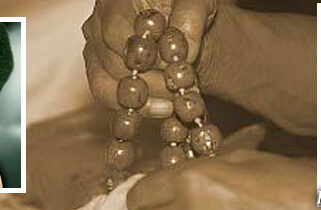10 The maha mantra is a spiritual sound vibration

The names of the Supreme Lord are not material:
[Daksa to Lord Visnu]: The Supreme Personality of Godhead, who is inconceivably opulent, who is devoid of all material names, forms and pastimes, and who is all−pervading, is especially merciful to the devotees who worship His lotus feet. Thus He exhibits transcendental forms and names with His different pastimes. May that Supreme Personality of Godhead, whose form is eternal and full of knowledge and bliss, be merciful to me.
In regard to the significant word anama−rtpah, Sri Sridhara Svami says, prakrta−nama−rtpa−rahito ‘pi. The word anama, which means “having no name,” indicates that the Supreme Personality of Godhead has no material name. Simply by chanting the name of Narayana to call his son, Ajamila attained salvation. This means that Narayana is not an ordinary mundane name; it is nonmaterial. The word anama, therefore, indicates that the names of the Supreme Lord do not belong to this material world. The vibration of the Hare Krsna maha−mantra is not a material sound, and similarly the form of the Lord and His appearance and activities are all nonmaterial. To show His causeless mercy to the devotees, as well as to the nondevotees, Krsna, the Supreme Personality of Godhead, appears in this material world with names, forms and pastimes, all of which are transcendental.
– Srimad Bhagavatam 6.4.33
The Hare Krsna maha−mantra should not be considered a material vibration:
In the Padma Purana it is said:
arcye visnau sila−dhir gurusu
nara−matir vaisnave jati−buddhir
visnor va vaisnavanam kali−mala−
mathane pada−tirthe ‘mbu−buddhih
sri−visnor namni mantre sakala−
kalusa−he sabda−samanya−buddhir
visnau sarvesvarese tad−itara−
sama−dhir yasya va naraki sah
No one should consider the Deity in the temple to be made of stone or wood, nor should one consider the spiritual master an ordinary human being. No one should consider a Vaisnava to belong to a particular caste or creed, and no one should consider caranamrta or Ganges water to be like ordinary water. Nor should anyone consider the Hare Krsna maha mantra to be a material vibration. All these expansions of Krsna in the material world are simply demonstrations of the Lord’s mercy and willingness to give facility to His devotees who are engaged in His devotional service within the material world.
– Sri Caitanya caritamrta Madhya lila 20.217
The holy name is a spiritual sound from the spiritual world:
[The maha−mantra] is not a material sound like the sounds we hear on the radio. It is a spiritual sound that comes from the spiritual world. Even in the material world we can release a sound from one place, and it can be heard thousands of miles away. A spiritual sound can be released from many trillions of miles away, and it can be heard, provided that one has the machine to capture it. That machine is bhagavata−prema. Those who have developed love of Godhead can hear it.
– Teachings of Lord Kapila, the Son of Devahtti
The holy name is eternally pure and transcendental:
Since Krsna and His holy name are identical, the holy name is eternally pure and beyond material contamination. It is the Supreme Personality of Godhead as a transcendental vibration. The holy name is completely different from material sound, as confirmed by Narottama dasa Thakura. Golokera prema−dhana, hari−nama−sankirtana: the transcendental vibration of hari−nama−sankirtana is imported from the spiritual world.
– Sri Caitanya caritamrta Adi lila 7.74
The name of the Lord is transcendental:
[Amsuman to Lord Kapila]: O completely peaceful Lord, although material nature, fruitive activities and their consequent material names and forms are Your creation, You are unaffected by them. Therefore, Your transcendental name is different from material names, and Your form is different from material forms. You assume a form resembling a material body just to give us instructions like those of Bhagavad−gita, but actually You are the supreme original person. I therefore offer my respectful obeisances unto You.
– Srimad Bhagavatam 9.8.24
The chanting of the maha−mantra is enacted from the spiritual platform:
By practical experience, one can perceive that by chanting this maha−mantra, or the Great Chanting for Deliverance, one can at once feel a transcendental ecstasy coming through from the spiritual stratum. In the material concept of life we are busy in the matter of sense gratification as if we were in the lower, animal stage. A little elevated from this status of sense gratification, one is engaged in mental speculation for the purpose of getting out of the material clutches. A little elevated from this speculative status, when one is intelligent enough, one tries to find out the supreme cause of all causes−within and without. And when one is factually on the plane of spiritual understanding, surpassing the stages of sense, mind, and intelligence, he is then on the transcendental plane. This chanting of the Hare Krsna mantra is enacted from the spiritual platform, and thus this sound vibration surpasses all lower strata of consciousness−namely sensual, mental, and intellectual. There is no need, therefore, to understand the language of the mantra, nor is there any need for mental speculation nor any intellectual adjustment for chanting this maha−mantra. It is automatic, from the spiritual platform, and as such, anyone can take part in the chanting without any previous qualification.
– The Science of Self Realization
Only the devotee can understand the transcendental nature of Krsna’s name:
[The demigods to Lord Krsna in the womb of Devaki]: O Lord, Your transcendental name and form are not ascertained by those who merely speculate on the path of imagination. Your name, form and attributes can be ascertained only through devotional service.
As stated in the Padma Purana:
atah sri−krsna−namadi
na bhaved grahyam indriyaih
sevonmukhe hi jihvadau
svayam eva sphuraty adah
“No one can understand the transcendental nature of the name, form, quality and pastimes of Sri Krsna through his materially contaminated senses. Only when one becomes spiritually saturated by transcendental service to the Lord are the transcendental name, form, quality and pastimes of the Lord revealed to him.” ¯(Bhakti rasamrta sindhu 1.2.234)1.2.234]
“One cannot understand the transcendental nature of the name, form, quality and pastimes of Sri Krsna through one’s materially contaminated senses. Only when one becomes spiritually saturated by transcendental service to the Lord are the transcendental name, form, quality and pastimes of the Lord revealed to him.“
Since Krsna and His transcendental name, form and activities are all of a transcendental nature, ordinary persons or those who are only slightly advanced cannot understand them.… Sevonmukhe hi jihvadau svayam eva sphuraty adah: Krsna’s transcendental name, form, attributes and activities can be revealed only when one engages in His service in full consciousness. This confirms Krsna’s own words in Bhagavad−gita (18.55):
bhaktya mam abhijanati
yavan yas casmi tattvatah
tato mam tattvato jnatva
visate tad−anantaram
“One can understand the Supreme Personality of Godhead as He is only by devotional service. And when one is in full consciousness of the Supreme Lord by such devotion, he can enter into the kingdom of God.”
Only by sevonmukha, by engaging oneself in the Lord’s service, can one realize the name, form and qualities of the Supreme Personality of Godhead.… The Lord is also known as Giridhari or Girivara−dhari. Because Krsna, for the sake of His devotees, lifted Govardhana Hill, the devotees appreciate the Lord’s inconceivable strength; but nondevotees, in spite of directly perceiving the Lord’s inconceivable strength and power, regard the Lord’s activities as fictitious. This is the difference between a devotee and a nondevotee. Nondevotees cannot give any nomenclature for the Supreme Personality of Godhead, yet the Lord is known as Syamasundara and Giridhari. Similarly the Lord is known as Devaki−nandana and Yasoda−nandana because He accepted the role of son for mother Devaki and mother Yasoda, and He is known as Gopala because He enjoyed the sport of maintaining the cows and calves. Therefore, although He has no mundane name, He is addressed by devotees as Devaki−nandana, Yasoda−nandana, Gopala and Syamasundara. These are all transcendental names that only devotees can appreciate and nondevotees cannot.
– Srimad Bhagavatam 10.2.36





